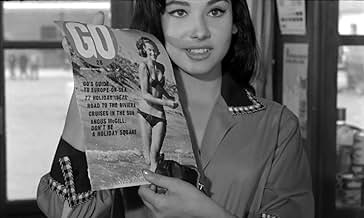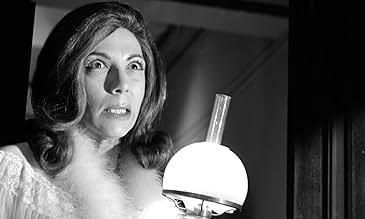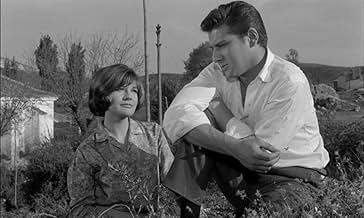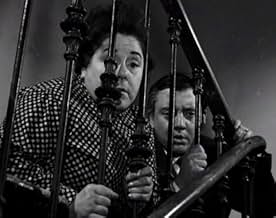El extraño viaje
- 1964
- 1 Std. 32 Min.
Füge eine Handlung in deiner Sprache hinzuPaquita and her brother Venancio, both single and childish, live in a small town near Madrid. Their bossy eldest sister Ignacia, also an old maid, dominates them. One night, Paquita hears he... Alles lesenPaquita and her brother Venancio, both single and childish, live in a small town near Madrid. Their bossy eldest sister Ignacia, also an old maid, dominates them. One night, Paquita hears her sister tell somebody about her intention to sell all the family wealth. Once the money i... Alles lesenPaquita and her brother Venancio, both single and childish, live in a small town near Madrid. Their bossy eldest sister Ignacia, also an old maid, dominates them. One night, Paquita hears her sister tell somebody about her intention to sell all the family wealth. Once the money is gathered, she wishes to travel to Paris with the mysterious person and get rid of her br... Alles lesen
- Auszeichnungen
- 1 wins total
- Doña Teresa
- (as Mª Luisa Ponte)
Empfohlene Bewertungen
So with the misleadingly mysterious title of `El Extraño Viaje', filmed in quaintly-styled black and white around the then peaceable and rural towns of Loeches, Madrid and La Pola, Valencia, today localities which are anything but peaceable and rural, was born. Two rather backward middle-aged brother and sister - nice playing here by Rafaela Aparicio completely overriding an unconvincing Jesús Franco (aka Jess Franco and about a hundred other pseudonyms, no doubt with the intention of covering up his own mediocrity, anyway) live in the unfortunate circumstance of their exceedingly rich elder sister's care in a huge mansion house. But when she decides she wants to sell up everything and travel the wide world - the Carribean, Paris ooh-la-la - her younger brother and sister get overly worried.
The `noir' aspect of film-making is hugely present with just that touch of ironic or even sarcastic humour which converts the telling almost into the horror genre; but that in itself was not the purpose, shall we say, of the film. Rather, the story itself and the locations, embroidered in a nostalgic black and white back-cloth, is a kind of wistful sojourn - especially seen from our stance near 40 years later - which intelligently combined with almost whimsical situations and `noir' humour so as to underline but not hamper any other gruesome aspects.
This certainly becomes clear when they enjoy a `good strong wine with plenty of body'. Excruciating, too say the least, and nicely juxtaposed in the development.
Carlos Larrañaga did not exactly impress with his performance: he seemed to lack that something which entoned with the other characters around him in the midst of the goings-on; his playing with Tota Alba lacked synthesis. However, Tota Alba was good, but Rafaela Aparicio was even better. Many of the lesser actors were really tremendous! Good thinking here by the director.
Yes, this film was a nice surprise, hailing as it does from those years which were rather blank.
Splendid movie that mingles black comedy , drama , rural conventionality , social habits and suspense . This is a piece of absurdity and nonsense , full of mysterious intrigue , thriller and ¨noir¨ happenings . The dramatic narrative is developed by means of flashbacks when at the end is uncovered the weird deeds . This is not the typical comedy by that time , here there is a brief social denounce about the repression during Franco dictatorship . As all the villagers are repressed characters , coerced by social conventionalism and hypocrisy . The original title ¨The crime of Mazarrón", was eliminated , that's why the explicit mention to the small town where the real killing was committed . Premiered 8 years later its shooting and in second class theatres ; the picture is nowadays a real ¨Cult Movie¨ . The best parts of the flick result to be the enjoyable descriptions of the villagers with colorful characters , including the ordinary roles : the priest , Mayor , pharmaceutic , the gossip people , the old men playing cards .... The picture has some unforgettable scenes as when it happens the special dance with earphones between Fernando and Ignacia , , the dressing parade carried out by Fernando and the surprising final images taken from ¨El Tonel de Amontillado¨ or ¨The Cask of Amontillado¨ by Edgar Allan Poe . The magnificent cast gives magnificent acting , such as : Tota Alba as the bossy eldest sister Ignacia , Vicente Parra as the musician who becomes involved with dark romances , Lina Canalejas as his virginal girlfriend and special mention for the two childish brothers : Jesus Franco and Rafaela Aparicio who steal the show playing their peculiar roles . Furthermore , other actors interpreting villagers , such as the shopkeeper María Luisa Ponte , Luis Marín , Joaquín Roa , Xan Das Bolas , Ramón Lillo and the gorgeous Sara Lezana .
Thrilling and suspenseful score by Cristobal Halffter , adding fragments from Huésped Del Sevillano by Guerrero and Canción Del Olvido by Serrano . Atmospheric and evocative cinematography by Jose F. Aguayo . Being voted seventh best Spanish film by professionals and critics in 1996 Spanish cinema centenary . The motion picture was compellingly directed by Fernando Fernández Gómez . This prolific and prestigious actor also directed a few films , such as : ¨Lazaro De Tormes , ¨Fuera De Juego ¨, ¨Mambrú Se Fue a La Guerra¨ , ¨5 Tenedores¨ , ¨5.000 Dias Juntos¨ , ¨Ninette¨ , ¨Venganza De Don Mendo¨ and his greatest success ¨Viaje a Ninguna Parte¨
Wusstest du schon
- WissenswertesVoted seventh best Spanish film by professionals and critics in 1996 Spanish cinema centenary.
- VerbindungenFeatured in Berlanga, fanáticamente contradictorio (2025)
Top-Auswahl
- How long is Strange Voyage?Powered by Alexa
Details
Box Office
- Weltweiter Bruttoertrag
- 746 $
- Laufzeit
- 1 Std. 32 Min.(92 min)
- Farbe
- Sound-Mix
- Seitenverhältnis
- 1.66 : 1





























